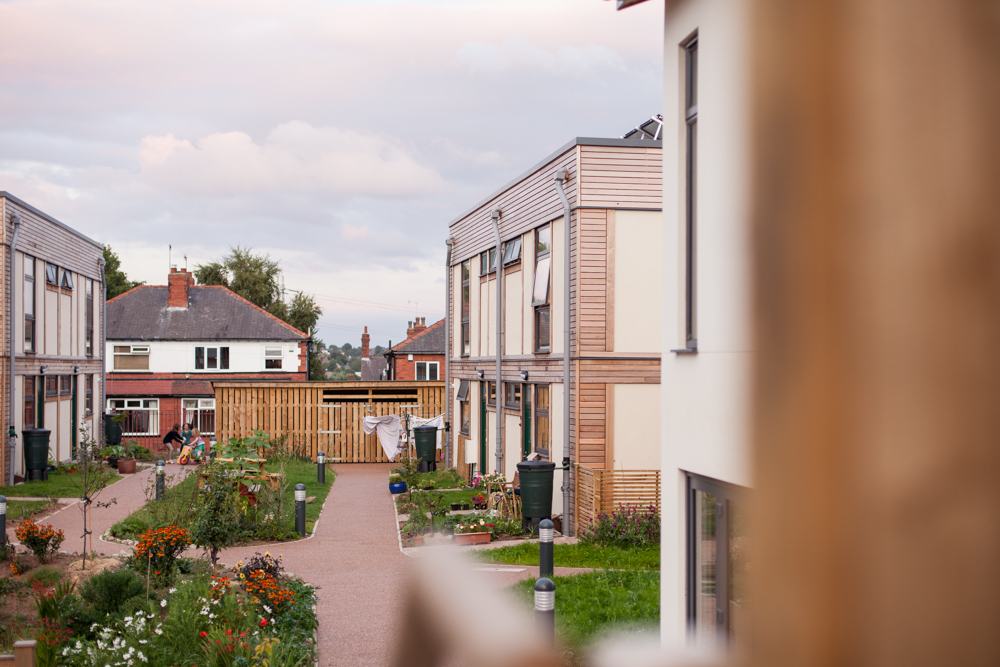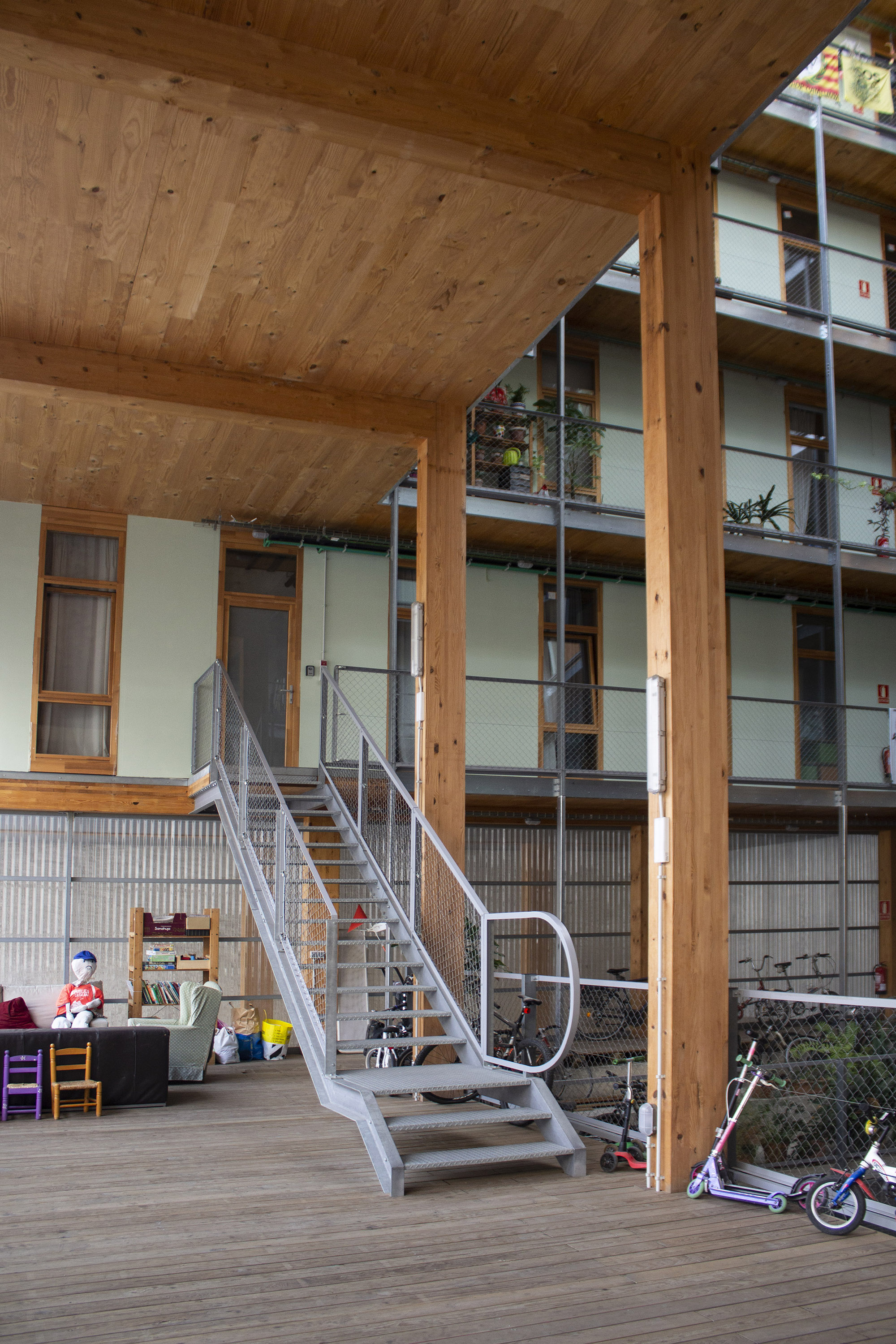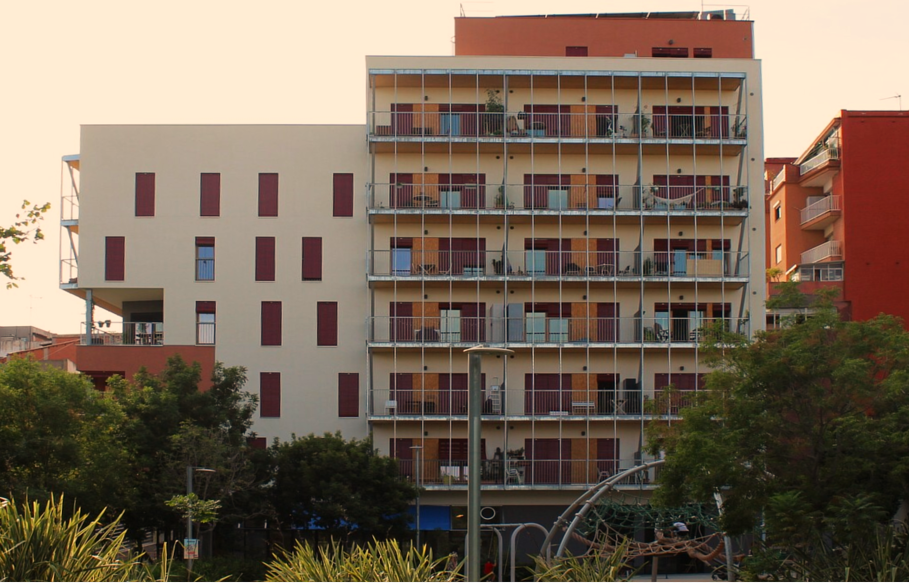
LILAC_Low Impact Living Affordable Community_Leeds
Created on 15-11-2024
Innovative aspects of the housing design/building
The model for LILAC is based on the Danish co-housing model: mixing private space with shared spaces to encourage social interaction. A plethora of green spaces include allotments, pond, a shared garden and a children’s play area. Akin to the private self-contained homes, the ‘common house’ includes a communal workshop, office, post room, food cooperative, kitchen, dining space, social space, bike storage, play area, guest rooms and laundry room. The LILAC community benefit from a large number of communal facilities including: a common house with shared laundry, kitchen, reading area and community area; car sharing; pooling household equipment and power tools; sharing common meals twice per week; growing food in the allotment; and looking for provisions in the local area (LILAC Coop, 2022b; ModCell, n.d.). A shared lifestyle whereby resources and amenities are combined, reduces energy use and saves money.
Construction and energy performance characteristics
Constructed under a Design and Build contract (Chatterton, 2015), LILAC boasts an innovative prefabricated ModCell construction that includes a low carbon timber frame insulated with straw-bale. Residents assisted with the labour, collectively adding the straw bale insulation. External walls and interior finishes are in a lime render, increasing benefits from passive solar heating through thermal mass. Air tightness was prioritised during construction, and triple-glazed windows help to decrease heat loss during winter, allowing for Mechanical Ventilation Heat Recovery Systems (MVHR) to regulate indoor air temperature. Further energy performance characteristics include solar thermal energy collection for space and hot water heating, 1.25kw solar PV array, with an extra 4kw on the common house (LILAC Coop, 2022b).
LILAC features a flood prevention system whereby a sustainable urban drainage system (SUDS) feeds the central pond. Roof rainwater runoff is collected into water butts that are later used to water the gardens. Overflow from water butts enters the central pond, which discharges into the public drainage system at a reduced rate. Furthermore, all ground surfaces of the site are permeable. Biodiversity planting and a permaculture design certificate course were integrated into the design at planning stage.
Major additional spending decisions were made whenever residents believed it would meet their core values and result in long term financial savings (Chatterton, 2015, p.68). Construction costs were therefore higher than the UK average – a 48 sqm one-bedroom flat cost £84,000 to build at a cost of £1,744 per sqm while the average costs in England were £1,200 per sqm. However, the annual heating demand of the homes is far less than the UK average of 140kWh/m² at around 30kWh/m², reducing energy consumption and bills up to two-thirds compared with existing UK housing stock (Chatterton, 2015, p.84).
Involvement of users and stakeholders
LILAC is owned by a cooperative, through the innovative equity-based model: Mutual Home Ownership Scheme (MHOS). The MHOS is a leaseholder approach (Chatterton, 2013) where residents purchase shares in the co-operative. The number of shares owned by each member is related in part to their income, and partly according to the size of their property. If someone earn a large income their house becomes more expensive, but another property subsequently becomes cheaper, thus conserving affordability. Affordable housing at LILAC is maintained as no more than 35% of net household income should be spent on housing (Chatterton, 2013; LILAC Coop, 2022a).
Minimum net income levels were set for each different house size to ensure a 35% equity share rate generates enough income to cover the mortgage repayments (Pickerill, 2015). The MHOS owns the homes and land and is made up of the residents who also manage LILAC. Members lease and occupy specific houses or flat from the MHOS. In effect, residents are their own landlords.
The building was financed by a combination of personal members invested capital, a long-term mortgage from the ethical bank Triodos, and a government grant of £420,000 from The Homes and Communities Agency’s Low Carbon Investment Fund, specifically to experiment with ModCell straw construction (Chatterton, 2013; Lawton & Atkinson, 2019). Each member makes monthly payments to the MHOS, who then pays the mortgage – deductions are made for service costs. In 2015, annual household minimum income for a home was set as at least £15,000.
‘Community agreements’ cover areas such as pets, food, communal cooking, use of the common house, management of green spaces, equal opportunities, vulnerable adults, the use of white goods, housing allocation and diversity, and garden upkeep (Chatterton, 2013; LILAC, 2021). “MHOS forms the democratic heart of the project” (Chatterton, 2013). All decisions are made democratically, using templates to generate and discuss proposals, explore pros and cons, generate amendments, and ratify decisions (Chatterton, 2013).
Relationship to urban environment
LILAC is in a highly integrated inner-city locality, situated in an urban neighbourhood of Leeds, on a site that was previously a school. Integrating with the wider community in West Leeds, the common house is used for “local meetings, film nights, meals and gatherings, workshops and has been used as the local polling station” (LILAC Coop, 2022b). LILAC has increased residents feeling of empowerment to participate in social action, working within the wider community to explore issues together and work for change. This has included supporting a local community association, local schools and holding charity and music events (LILAC, 2021).
Behaviour and wellbeing
LILACs community act in the knowledge that an adequate response to climate change and energy reduction takes shifting the way we live, enacting behavioural changes that contribute to a post-carbon transition. Decisions in cohousing are made as a community, rather than individual consumers or households. Residents report a much higher health satisfaction – from 58% to 76% – and life satisfaction – from 58% to 87% – compared to previous accommodation (LILAC, 2021). Both physical and mental health improvements have been reported since moving to the community due to LILAC’s “plentiful greenspace, sustainable travel options, better high air quality and natural light in the homes, greater social interaction and opportunities for socialising with neighbours” (LILAC, 2021). Further benefits of LILAC as a cohousing scheme include increased safety and wellbeing, natural surveillance and support for the elderly, reduced car numbers combined with car separation and car-free home zones to increase safety as well as reducing carbon emissions related to car use (Chatterton, 2013).
S.Furman (ESR2)
Read more
->

La Borda
Created on 16-10-2024
The housing crisis
After the crisis of 2008, it became obvious that the mainstream mechanisms for the provision of housing were failing to provide secure and affordable housing for many households, especially in the countries of the European south such as Spain. It is in this context that alternative forms emerged through social initiatives. La Borda is understood as an alternative form of housing provision and a tenancy form in the historical and geographical context of Catalonia. It follows mechanisms for the provision of housing that differ from predominant approaches, which have traditionally been the free market, with a for-profit and speculative role, and a very low percentage of public provision (Allen, 2006). It also constitutes a different tenure model, based on collective instead of private ownership, which is the prevailing form in southern Europe. As such, it encompasses the notions of community engagement, self-management, co-production and democratic decision-making at the core of the project.
Alternative forms of housing
In the context of Catalonia, housing cooperatives go back to the 1960s when they were promoted by the labour movement or by religious entities. During this period, housing cooperatives were mainly focused on promoting housing development, whether as private housing developers for their members or by facilitating the development of government-protected housing. In most cases, these cooperatives were dissolved once the promotion period ended, and the homes were sold.
Some of these still exist today, such as the “Cooperativa Obrera de Viviendas” in El Prat de Llobregat. However, this model of cooperativism is significantly different from the model of “grant of use”, as it was used mostly as an organizational form, with limited or non-existent involvement of the cooperative members.
It was only after the 2008 crisis, that new initiatives have arisen, that are linked to the grant-of-use model, such as co-housing or “masoveria urbana”. The cooperative model of grant-of-use means that all residents are members of the cooperative, which owns the building. As members, they are the ones to make decisions about how it operates, including organisational, communitarian, legislative, and economic issues as well as issues concerning the building and its use. The fact that the members are not owners offers protection and provides for non-speculative development, while actions such as sub-letting or transfer of use are not possible. In the case that someone decides to leave, the flat returns to the cooperative which then decides on the new resident. This is a model that promotes long-term affordability as it prevents housing from being privatized using a condominium scheme. The grant -of -use model has a strong element of community participation, which is not always found in the other two models. International experiences were used as reference points, such as the Andel model from Denmark and the FUCVAM from Uruguay, according to the group (La Borda, 2020). However, Parés et al. (2021) believe that it is closer to the Almen model from Scandinavia, which implies collective ownership and rental, while the Andel is a co-ownership model, where the majority of its apartments have been sold to its user, thus going again back to the free-market stock.
In 2015, the city of Barcelona reached an agreement with La Borda and Princesa 49, allowing them to become the first two pilot projects to be constructed on public land with a 75-year leasehold. However, pioneering initiatives like Cal Cases (2004) and La Muralleta (1999) were launched earlier, even though they were located in peri-urban areas. The main difference is that in these cases the land was purchased by the cooperative, as there was no such legal framework at the time. This means that these projects are classified as Officially Protected Housing (Vivienda de Protección Oficial or VPO), and thus all the residents must comply with the criteria to be eligible for social housing, such as having a maximum income and not owning property. Also, since it is characterised as VPO there is a ceiling to the monthly fee to be charged for the use of the housing unit, thus keeping the housing accessible to groups with lower economic power. This makes this scheme a way to provide social housing with the active participation of the community, keeping the property public in the long term. After the agreed period, the plot will return to the municipality, or a new agreement should be signed with the cooperative.
The neighbourhood movement
In 2011, a group of neighbours occupied one of the abandoned industrial buildings in the old industrial state of Can Batlló in response to an urban renewal project, with the intention of preserving the site's memory (Can Batlló, 2020; Girbés-Peco et al., 2020). The neighbourhood movement known as "Recuperem Can Batlló" sought to explore alternative solutions to the housing crisis of the time. The project started in 2012, after a series of informal meetings with an initial group of 15 people who were already active in the neighbourhood, including members of the architectural cooperative Lacol, members of the labour cooperative La Ciutat Invisible, members of the association Sostre Civic and people from local civic associations. After a long process of public participation, where the potential uses of the site were discussed, they decided to begin a self-managed and self-promotion process to create La Borda. In 2014 they legally formed a residents’ cooperative and after a long process of negotiation with the city council, they obtained a lease for the use of the land for 75 years in exchange for an annual fee. At that time, the group expanded, and it went from 15 members to 45. After another two years of work, construction started in 2017 and the first residents moved in the following year.
The participatory process
The word “participation” is sometimes used as a buzzword, where it refers to processes of consultation or manipulation of participants to legitimise decisions, leading it to become an empty signifier. However, by identifying the hierarchies that such processes entail, we can identify higher levels of participation, that are based on horizontality, reciprocity, and mutual respect. In such processes, participants not only have equal status in decision-making, but are also able to take control and self-manage the whole process. This was the case with La Borda, a project that followed a democratic participation process, self-development, and self-management. An important element was also the transdisciplinary collaboration between the neighbours, the architects, the support entities and the professionals from the social economy sector who shared similar ideals and values.
According to Avilla-Royo et al. (2021), greater involvement and agency of dwellers throughout the lifetime of a project is a key characteristic of the cooperative housing movement in Barcelona. In that way, the group collectively discussed, imagined, and developed the housing environment that best covered their needs in typological, material, economic or managerial terms. The group of 45 people was divided into different working committees to discuss the diverse topics that were part of the housing scheme: architecture, cohabitation, economic model, legal policies, communication, and internal management. These committees formed the basis for a decision-making assembly. The committees would adapt to new needs as they arose throughout the process, for example, the “architectural” committee which was responsible for the building development, was converted into a “maintenance and self-building” committee once the building was inhabited. Apart from the specific committees, the general assembly is the place, where all the subgroups present and discuss their work. All adult members have to be part of a committee and meet every two weeks. The members’ involvement in the co-creation and management of the cooperative significantly reduced the costs and helped to create the social cohesion needed for such a project to succeed.
The building
After a series of workshops and discussions, the cooperative group together with architects and the rest of the team presented their conclusions on the needs of the dwellers and on the distribution of the private and communal spaces. A general strategy was to remove areas and functions from the private apartments and create bigger community spaces that could be enjoyed by everyone. As a result, 280 m2 of the total 2,950 m2 have been allocated for communal spaces, accounting for 10% of the entire built area. These spaces are placed around a central courtyard and include a community kitchen and dining room, a multipurpose room, a laundry room, a co-working space, two guest rooms, shared terraces, a small community garden, storage rooms, and bicycle parking. La Borda comprises 28 dwellings that are available in three different typologies of 40, 50 and 76 m2, catering to the needs of diverse households, including single adults, adult cohabitation, families, and single parents. The modular structure and grid system used in the construction of the dwellings offer the flexibility to modify their size in the future.
The construction of La Borda prioritized environmental sustainability and minimized embedded carbon. To achieve this, the foundation was laid as close to the surface as possible, with suspended flooring placed a meter above the ground to aid in insulation. Additionally, the building's structure utilized cross-laminated timber (CLT) from the second to the seventh floors, after the ground floor made of concrete. This choice of material had the advantage of being lightweight and low carbon. CLT was used for both the flooring and the foundation The construction prioritized the optimization of building solutions through the use of fewer materials to achieve the same purpose, while also incorporating recycled and recyclable materials and reusing waste. Furthermore, the cooperative used industrialized elements and applied waste management, separation, and monitoring. According to the members of the cooperative (LaCol, 2020b), an important element for minimizing the construction cost was the substitution of the underground parking, which was mandatory from the local legislation when you exceed a certain number of housing units, with overground parking for bicycles. La Borda was the first development that succeeded not only in being exempt from this legal requirement but also in convincing the municipality of Barcelona to change the legal framework so that new cooperative or social housing developments can obtain an “A” energy ranking without having to construct underground parking.
Energy performance goals focused on reducing energy demands through prioritizing passive strategies. This was pursued with the bioclimatic design of the building with the covered courtyard as an element that plays a central role, as it offers cross ventilation during the warm months and acts as a greenhouse during the cold months. Another passive strategy was enhanced insulation which exceeds the proposed regulation level. According to data that the cooperative published, the average energy consumption of electricity, DHW, and heating per square meter of La Borda’s dwellings is 20.25 kWh/m², which is 68% less, compared to a block of similar characteristics in the Mediterranean area, which is 62.61 kWh/m² (LaCol, 2020a). According to interviews with the residents, the building’s performance during the winter months is even better than what was predicted. Most of the apartments do not use the heating system, especially the ones that are facing south. However, the energy demands during the summer months are greater, as the passive cooling system is not very efficient due to the very high temperatures. Therefore, the group is now considering the installation of fans, air-conditioning, or an aerothermal installation that could provide a common solution for the whole building. Finally, the cooperative has recently installed solar panels to generate renewable energy.
Social impact and scalability
According to Cabré & Andrés (2018), La Borda was created in response to three contextual factors. Firstly, it was a reaction to the housing crisis which was particularly severe in Barcelona. Secondly, the emergence of cooperative movements focusing on affordable housing and social economies at that time drew attention to their importance in housing provision, both among citizens and policy-makers. Finally, the moment coincided with a strong neighbourhood movement around the urban renewal of the industrial site of Can Batlló. La Borda, as a bottom-up, self-initiated project, is not just an affordable housing cooperative but also an example of social innovation with multiple objectives beyond providing housing.
The group’s premise of a long-term leasehold was regarded as a novel way to tackle the housing crisis in Barcelona as well as a form of social innovation. The process that followed was innovative as the group had to co-create the project, which included the co-design and self-construction, the negotiation of the cession of land with the municipality, and the development of financial models for the project. Rather than being a niche project, the aim of La Borda is to promote integration with the neighbourhood. The creation of a committee to disseminate news and developments and the open days and lectures exemplify this mission. At the same time, they are actively aiming to scale up the model, offering support and knowledge to other groups. An example of this would be the two new cooperative housing projects set up by people that were on the waiting list for la Borda. Such actions lead to the creation of a strong network, where experiences and knowledge are shared, as well as resources.
The interest in alternative forms of access to housing has multiplied in recent years in Catalonia and as it is a relatively new phenomenon it is still in a process of experimentation. There are several support entities in the form of networks for the articulation of initiatives, intermediary organizations, or advisory platforms such as the cooperative Sostre Civic, the foundation La Dinamo, or initiatives such as the cooperative Ateneos, which were recently promoted by the government of Catalonia. These are also aimed at distributing knowledge and fostering a more inclusive and democratic cooperative housing movement. In the end, by fostering the community’s understanding of housing issues, and urban governance, and by seeking sustainable solutions, learning to resolve conflicts, negotiate and self-manage as well as developing mutual support networks and peer learning, these types of projects appear as both outcomes and as drivers of social transformation.
Z.Tzika (ESR10)
Read more
->




